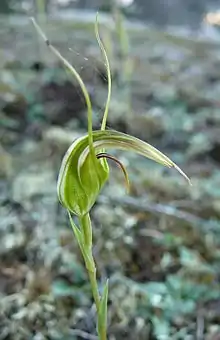Pterostylis longipetala
Pterostylis longipetala, commonly known as the curved greenhood, is a species of orchid endemic to eastern Australia. As with similar greenhoods, the flowering plants differ from those which are not flowering. The non-flowering plants have a rosette of leaves flat on the ground but the flowering plants have a single flower with leaves on the flowering spike. This greenhood has dark green, brown and white flowers which lean slightly forwards and have sharply-pointed petals and a long, curved labellum.
| Curved greenhood | |
|---|---|
 | |
| Pterostylis longipetala growing in Bournda National Park | |
| Scientific classification | |
| Kingdom: | Plantae |
| Clade: | Tracheophytes |
| Clade: | Angiosperms |
| Clade: | Monocots |
| Order: | Asparagales |
| Family: | Orchidaceae |
| Subfamily: | Orchidoideae |
| Tribe: | Cranichideae |
| Genus: | Pterostylis |
| Species: | P. longipetala |
| Binomial name | |
| Pterostylis longipetala | |
| Synonyms[2] | |
Description
Pterostylis longipetala is a terrestrial, perennial, deciduous, herb with an underground tuber and when not flowering, a rosette of between three and six egg-shaped, dark green leaves lying flat on the ground. Each leaf is 8–15 mm (0.3–0.6 in) long and 4–10 mm (0.2–0.4 in) wide. Flowering plants have a single flower 14–17 mm (0.6–0.7 in) long and 4–8 mm (0.2–0.3 in) wide which leans slightly forwards, on a flowering stem 100–160 mm (4–6 in) high with between three and five stem leaves. The flowers are dark green, brown and white. The dorsal sepal and petals are fused, forming a hood or "galea" over the column. The dorsal sepal has a thread-like tip 6–12 mm (0.2–0.5 in) long and the petals have pointed tips. The lateral sepals are erect, held closely against the galea, have thread-like tips 20–25 mm (0.8–1 in) long and a V-shaped sinus between their bases. The labellum is 12–15 mm (0.5–0.6 in) long, about 3 mm (0.1 in) wide, dark reddish-brown and curved, and protrudes above the sinus. Flowering occurs from April to June.[3][4][5]
Taxonomy and naming
Pterostylis longipetala was first formally described in 1943 by Herman Rupp from a specimen collected at Batemans Bay. The description was published in Proceedings of the Linnean Society of New South Wales.[1][6] The specific epithet (longipetala) is derived from the Latin words longus meaning "long"[7]:494 and petalum meaning "petal".[7]:616 Rupp did not give a reason for this epithet but did note that "the petals are narrower and longer than in any other species of Pterostylis known to me".[6]
Distribution and habitat
The curved greenhood grows on moist slopes in coastal and near coastal forests in New South Wales.[3][4]
References
- "Pterostylis longipetala". APNI. Retrieved 6 June 2017.
- "Pterostylis longipetala". World Checklist of Selected Plant Families (WCSP). Royal Botanic Gardens, Kew.
- Jones, David L. (2006). A complete guide to native orchids of Australia including the island territories. Frenchs Forest, N.S.W.: New Holland. pp. 295–296. ISBN 978-1877069123.
- Jones, David L. "Pterostylis longipetala". Royal Botanic Garden Sydney: plantnet. Retrieved 6 June 2017.
- Harden, Gwen J. (1993). Flora of New South Wales (1st ed.). Kensington NSW: New South Wales University Press. p. 180. ISBN 978-0868401881.
- Rupp, Herman (1943). "Contributions to the Orchidology of New South Wales". Proceedings of the Linnean Society of New South Wales. 68: 9. Retrieved 6 June 2017.
- Brown, Roland Wilbur (1956). The Composition of Scientific Words. Washington, D.C.: Smithsonian Institution Press.